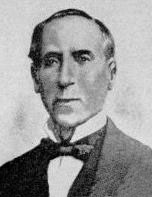
Politics of Liberia takes place in a framework of a presidential representative democratic republic modeled on the government of the United States, whereby the President is the head of state and head of government; unlike the United States, however, Liberia is a unitary state as opposed to a federation and has a pluriform multi-party system rather than the two-party system that characterizes US politics. Executive power is exercised by the government. Legislative power is vested in both the government and the two chambers of the legislature.
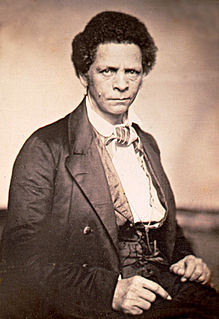
Joseph Jenkins Roberts was the first (1848–1856) and seventh (1872–1876) President of Liberia. Born free in Norfolk, Virginia, US, Roberts emigrated to Liberia in 1829 as a young man. He opened a trading store in Monrovia, and later engaged in politics. When Liberia became independent on July 26, 1847, Roberts was elected the first black American president for the Republic of Liberia, serving until 1856. In 1872 he was elected again to serve as Liberia's seventh president.
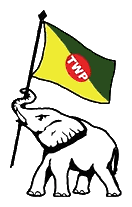
The True Whig Party (TWP), also known as the Liberian Whig Party (LWP), is the oldest political party in Liberia. Founded in 1869 by primarily Americo-Liberians, the party dominated Liberian politics from 1878 until 1980. The nation was virtually a one-party state, although opposition parties were never outlawed. Initially, its ideology was strongly influenced by that of the United States Whig Party.

The 1997 Liberian general election was held on 19 July 1997 as part of the 1996 peace agreement ending the First Liberian Civil War. The presidency, as well as all seats in the House of Representatives and the Senate were up for election. Voter turnout was around 89%. Former rebel leader Charles Taylor and his National Patriotic Party (NPP) won the election by a substantial margin; Taylor won 75.3% of the vote in the presidential election, whilst the NPP won the same number of votes in the parliamentary election. Taylor was inaugurated as president on 2 August 1997.

General elections were held in Liberia on 15 October 1985. These were the first elections since the 12 April 1980 military coup that brought Samuel Doe to power. During 1984, a new draft Constitutional referendum was approved, which allowed a 58 member civilian and military combined Interim National Assembly, headed by President Samuel Doe. The ban on political parties were lifted and four parties, namely, the President's National Democratic Party of Liberia, Liberian Action Party, Unity Party and Liberia Unification Party were in fray.

The Legislature of Liberia is the bicameral legislature of the government of Liberia. It consists of a Senate – the upper house, and a House of Representatives – the lower house, modeled after the United States Congress. Sessions are held at the Capitol Building in Monrovia. Legislature of Liberia is considered one of the three branches of government based on the Article III of the Constitution of Liberia that stipulates all three branches ought to be equal and coordinated based on the Principle of checks and balances.

The Vice President of the Republic of Liberia is the second-highest executive official in Liberia, and one of only two elected executive offices along with the President. The Vice President is elected on the same ticket with the president to a six-year term. In the event of the death, resignation or removal of the president, the Vice President ascends to the presidency, which he or she holds for the remainder of their predecessor's term. The Vice President also serves as the President of the Senate and may cast a vote in the event of a tie. The current Vice President is Jewel Taylor, serving under President George Weah. She began her term on January 22, 2018.
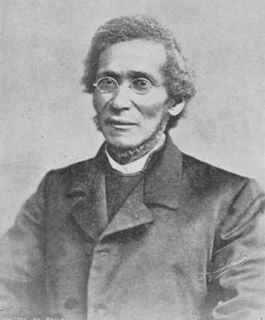
Daniel Alexander Payne was an American bishop, educator, college administrator and author. A major shaper of the African Methodist Episcopal Church (A.M.E.), Payne stressed education and preparation of ministers and introduced more order in the church, becoming its sixth bishop and serving for more than four decades (1852–1893) as well as becoming one of the founders of Wilberforce University in Ohio in 1856. In 1863 the AME Church bought the college and chose Payne to lead it; he became the first African-American president of a college in the United States and served in that position until 1877.
Samuel Benedict (1792–1854) was a Liberian politician and jurist who served as the 1st Chief Justice of Liberia. He was born a slave in the U.S. state of Georgia in 1792, and purchased his freedom and that of his family. He emigrated to Liberia in 1835, on the ship Indiana.
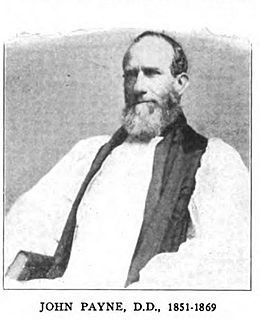
John Payne was a Missionary Bishop from the Episcopal Church to Liberia, and the first bishop of the Episcopal Diocese of Liberia.

The 2011 Liberian general election was held on 11 October 2011, with a presidential runoff election held on 8 November 2011. The presidency, as well as all seats in the House of Representatives and half of the seats in the Senate, were up for election. The election was overseen by the National Elections Commission (NEC).

General elections were held for the first time in newly independent Liberia on 27 September 1847, alongside a constitutional referendum. The result was a victory for Governor Joseph Jenkins Roberts of the Pro-Administration Party, who defeated Samuel Benedict of the Anti-Administration Party. In a separate vote, Nathaniel Brander was elected Vice President.

Presidential elections were held in Liberia in May 1869. The result was a victory for Edward James Roye of the True Whig Party, defeating incumbent President James Spriggs Payne. The election was very close, with the House of Representatives required to decide the final outcome.

Presidential elections were held in Liberia in May 1875. The result was a victory for former President James Spriggs Payne of the Republican Party. Payne took office on 3 January 1876.

General elections were held in Liberia on 1 May 1951, the first to be held under universal suffrage, as previously only male descendants of Americo-Liberians had been allowed to vote. This was the first elections in Liberia where women and the local Liberians owning property were allowed to vote based on a Constitutional Referendum in 1945–46. In the presidential election, William Tubman of the True Whig Party was the only candidate, and was re-elected unopposed.
Anthony David Williams (1799-1860) was a Liberian politician who served as the Vice President of Liberia from 1850 to 1854 under President Joseph Jenkins Roberts. Born free in the United States in 1799, he immigrated as a Methodist preacher from Petersburg, Virginia to Liberia in 1823. Williams served as the Colonial Agent for the American Colonization Society from 1837 to 1839. During his tenure, the colony of Mississippi-in-Africa was established. In the 1849 elections, Williams ran for vice president against incumbent Nathaniel Brander. The failure of any candidate to secure a majority of the vote led the race to be thrown to the House of Representatives, which chose Williams as vice president. He died in 1860.

Legislative elections were held in Liberia on 1 December 1840.


